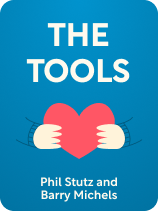

This article is an excerpt from the Shortform book guide to "The Tools" by Phil Stutz and Barry Michels. Shortform has the world's best summaries and analyses of books you should be reading.
Like this article? Sign up for a free trial here.
Do you want to improve a specific area of your life? What are the four universal powers that everybody can tap into?
In their book The Tools, Phil Stutz and Barry Michels argue that universal powers help you fulfill your potential and improve the lives of everyone around you. Each universal power supports your growth in a different area of your life.
Keep reading to learn more about how these universal powers can help start your spiritual journey.
What Does It Mean to Reach Your Full Potential?
The powers the authors identify are positive momentum, personal truth, radiant love, and gratitude. Here, we’ll discuss what fulfilling your potential means to the authors and explore how to get in touch with the universal powers to start your spiritual journey.
According to the authors, reaching your full potential means becoming a changemaker (or what the authors call a creator). When you become a changemaker, your actions will be aligned with the universal powers: You see it as your purpose to make positive changes in the world. As a changemaker, you’ll view life’s challenges as opportunities to improve yourself and help those around you.
The authors say that when you’ve successfully implemented their strategies in your daily life, you’ll begin to live in accordance with these three changemaker principles:
- You’ll leave the world a better place than you found it.
- You’ll have the courage to do what you think is right, regardless of the opinions of others.
- You’ll be disciplined enough to overcome immediate gratification and stay focused on your goals.
In contrast to changemakers are stagnators. The authors explain that stagnators aren’t interested in improving themselves or contributing to the world around them. Instead, they expect the world to serve them. When life presents stagnators with difficulties, they feel unfairly treated and unmotivated to overcome those challenges.
How Do You Get In Touch With the Universal Powers?
According to the authors, life challenges can be catalysts for connection with universal powers. This is because challenges present opportunities to apply the authors’ strategies, which they say will help you take actions that embody the universal powers’ qualities. In other words, obstacles push you to the doorstep of the universal powers, and the authors’ strategies open the door.
For example, you might be faced with a sudden responsibility in your personal life that demands a lot of discipline from you. So you turn to the authors’ strategy of embracing pain (which we’ll explore later) to persist through the difficulty.
The authors explain that we all form unique, personal relationships with the universal powers. We all have our own obstacles in life and we all conceptualize universal powers a little differently. Stutz and Michels say it’s crucial to embrace the individuality of your spiritual journey. However you conceptualize the universal powers, faith means fundamentally trusting in these powers to support you when you need help. The authors admit that they can’t prove the existence and influence of the universal powers through scientific evidence or logic—but they say you can experience these powers through their five strategies.
How The Tools Relates to Stoicism
Stutz and Michels’s advice to view challenges as opportunities for good aligns with the principles of Stoicism, a school of philosophy that was founded in Greece during the third century BCE. The most fundamental idea of Stoicism is that striving to live in accordance with the four cardinal virtues (temperance, courage, justice, and wisdom) will help you live a good life. In The Obstacle Is the Way, Ryan Holiday explains that Stoics also believe situations aren’t inherently good or bad—rather, your mindset determines their quality. Viewed in this framework, Stutz and Michels’s concept of a stagnator—someone who interprets a situation negatively and responds unproductively—would be seen as lacking Stoic virtue.

———End of Preview———
Like what you just read? Read the rest of the world's best book summary and analysis of Phil Stutz and Barry Michels's "The Tools" at Shortform.
Here's what you'll find in our full The Tools summary:
- What it means to reach your full potential
- How to embrace pain—and why you should
- Why gratitude matters and how to let it guide you






